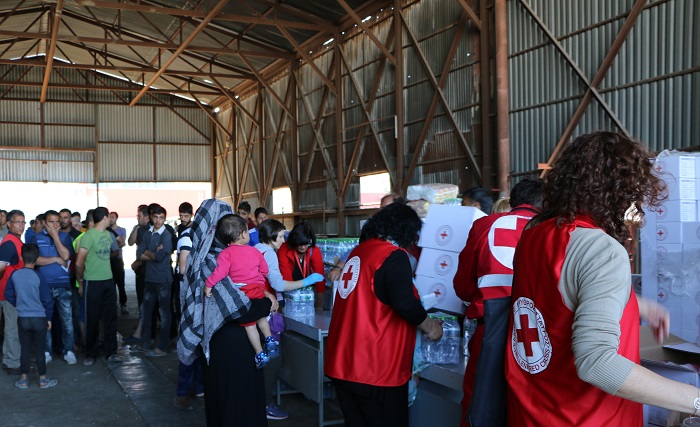Hellenic Red Cross increases support for thousands of families trapped in camps
Medical care and vital food, water and emergency supplies are being prioritised by Red Cross teams at one of the Greek capital’s main camps for migrants.
This week the Hellenic Red Cross started supplying tinned food, water and toiletries in the open port-side facility of Skaramagas, currently home to about 2,000 people - the majority of whom are families from Iraq and Syria who have escaped the fighting.

An emergency medical team from the Spanish and French Red Cross has also set up a clinic at the camp providing basic health care. Head of international relations at the Hellenic Red Cross, Angelica Fanaki, said: "We are stepping up in Skaramagas and we are listening to people in the camp so that we can adapt our response to meet their needs.
"Food, hygiene and health are our priorities right now, but we are also working to improve life inside the camp – making sure people have enough information, shade to protect them in the summer months and activities to help combat the stress of being stranded.”
Saba Fawiz, escaped from Mosul in Iraq with her husband Fawaz and their four children. The family took an incredible risk to escape the brutal regime of militants controlling their home city. After hiding in in a truck fitted with a false floor, 39-year-old Saba and her family spent five hours crammed in the cramped cavity while they travelled to Al Raqqa in Syria. There they went into hiding in a basement for several days, fearing they would be executed by armed groups. Now, the Fawiz family is living in a container kitted out with bunk beds and a bathroom in Skaramagas. While they say conditions in the camp are better than other facilities in they have stayed in, the future is what worries them the most.
Saba’s son Ibrahim, 19, said: "We arrived in Greece on January 28 and finally arrived here about a week ago. Life is on hold here – we don’t know what will happen next or how long we’ll have to wait.”
About 50,000 people remain stranded across Greece and face negotiating a complex asylum system fraught with frustration and uncertainty. Following implementation of the EU-Turkey deal on migration, all new ‘irregular’ migrants crossing from Turkey to the Greek islands after 20 March are set to be returned to Turkey, with "one in, one out” agreement aiming to resettle one Syrian refugee residing in Turkey for every Syrian returned to Turkey from Greece. However, these rules do not apply to the tens of thousands of people who arrived before 20 March-people like Saba and her family. They remain in limbo.
"We know that it is difficult for everyone involved in this situation – for governments and for Greek people and Europe,” Ibrahim said. "But we need to continue our lives.”
For media inquiries, please contact Eva Oyón on: eva.oyon@redcross.eu or +32 2 235 09 22

